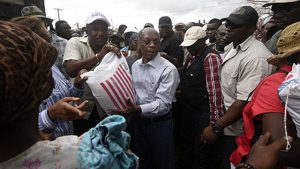
Haiti’s former president Bertand Aristide (C) helps distribute food at a shelter in Port-Salut, southwest of Port-au-Prince, on October 9, 2016, days after the passage of Hurricane Matthew through Haiti.
PORT-SALUT, Haiti (AFP) – “Help us,” pleaded survivors of Hurricane Matthew in southern Haiti on Sunday as they massed in shelters or in crumpled homes along a shredded coast.
In several towns joined by a debris-strewn road, residents begged for water and food from passers-by. Many said they felt abandoned by aid groups in the country who were nowhere in sight.
In Port-Salut, a former tourist town mostly flattened by the storm on Tuesday, some of around 400 people taking refuge in a school said they had been without basic care for nearly a week.
“We’ve received nothing at all. The situation is really grave,” Antony Bergel told AFP.
“We’re waiting for a lot of help. We need shelters, water, food.”
Around the school, houses were sliced open by fallen trees, most of them stripped of roofs. Palm trees left standing were stripped of fronds on one side and often bent over — forlorn, lopsided testimony to the violent winds that had struck.
Those in the school said they had been visited Saturday by a small Doctors Without Borders team that bandaged open wounds, but with no other attention from organizations that include several UN agencies operating in the desperately poor country.
-Late Sunday, former president Jean-Bertrand Aristide, who was ousted in a 2004 coup, turned up with a truck full of aid to give to the people in the shelter, who pushed and shoved as they lined up by the vehicle.
“We are going to increase the solidarity,” Aristide told the crowd before passing among them to accept hugs and handshakes.
He declined to respond to requests for comment, and left with his bodyguards in a car before the donated bags of food and clothes were handed out.
His appearance took place on what was meant to be an election day to choose Haiti’s next president.
But polls were postponed following the hurricane, further prolonging the political limbo in which the country has been mired since elections were scrapped in 2015 amid violence and massive fraud.
While demand for more basic aid mounted, some in the shelter stressed that, longer term, what they needed was jobs, not handouts.
“We need work. How can we get by without jobs?” asked Joseph Marie Juna, 50, who said she was responsible for five children.
Farther along the road in the next village, a 50-year-old carpenter, Raymond Alsindor, had found one part of his business booming: making wooden coffins.
From barely one order per month before the storm, he had now made five wooden caskets since the hurricane, each selling for around $50, he told AFP. His latest coffin stood outside his makeshift shack, ready for the next customer.
In another town, La Gaudray, close to the provincial capital Les Cayes, residents gathered for mass in a church whose roof had been ripped off.
Standing in the tropical sunlight streaming into the building, the 100-strong congregation sang and listened as the priest urged them to help their neighbours through these trying times.
One churchgoer, Abner Jean Charles, 52, said the devastation to so many homes had kept some people from attending.
“About 30 per cent didn’t come. There were a lot of victims of the storm,” he said.
There was, however, no sense that Haiti, whose population is generally deeply Christian, had been divinely punished.
Instead, the tone of the singing and prayers was almost joyous.
“We came to pray to God for all he did for us — that we are still alive,” said Elsie Gerard, 45.
